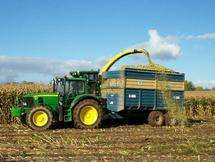Productive farms can be 'greener than organic': study

(������ƵOrg.com) -- Farms that aim for high food production using environmentally-friendly practices could be better for the environment than both organic and conventional farms.
A study, led by Oxford University scientists, compared the environmental impact of different farming systems.
The researchers found that ‘integrated’ farms that maximised crop yields whilst using environmentally-friendly techniques – such as crop rotation, organic fertilisers, over winter cover crops, and minimal use of pesticides – would use less energy and generate lower greenhouse gas emissions per unit of production than both organic and conventional farms.
A report of the research is published in the journal Agricultural Systems.
‘Farming in a way that’s good for the environment doesn’t have to mean accepting a dramatic drop in food production,’ said Dr Hanna Tuomisto, who led the research at Oxford University’s Wildlife Conservation Research Unit (WildCRU). ‘Our research suggests that integrated farming systems, which combine the best practices for producing high yields with low negative environmental impacts, can be more beneficial for the environment than either organic or conventional farming.’
Professor David Macdonald of Oxford University’s WildCRU, who directed the research, said: ‘integrating the needs of food production and wildlife conservation is a major 21st Century challenge – humanity needs both, and it’s only by taking account of all the costs and benefits that the best compromises can be found.’
The research also found that possible alternative land uses should be factored in to any assessment of different farming systems.
Dr Tuomisto said: ‘If you grow food organically you have to use much more land to grow the same amount of food than you would using other methods, meaning this land cannot be used for something else. Once we factored in the potential alternative land uses, both integrated and conventional farming systems, which produce high volumes of food per acre, began to look much more attractive in terms of overall energy use, emissions, and the impact on biodiversity.’
The study considered three different alternative uses for land not used in food production; energy crop production (growing Miscanthus), managed forest, and natural forest. The researchers assumed that biomass from either Miscanthus or managed woodland would be burnt to generate heat.
More information: A report of the research, entitled ‘Comparing energy balances, greenhouse gas balances and biodiversity impacts of contrasting farming systems with alternative land uses’, is published in the journal Agricultural Systems.
Provided by Oxford University

















